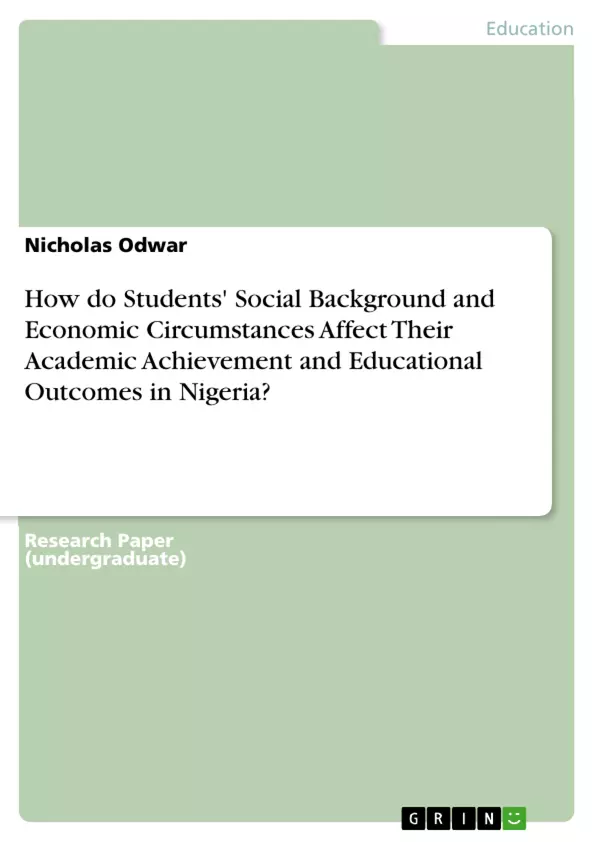The study examined the effects of social background and economic circumstances on academic performance and educational outcomes of students in Nigeria. The theoretical framework adopted for this study is cultural capital theory. The research design adopted for the study is qualitative research design. Sources of data are secondary sources and the method of data analysis is thematic analysis. The study found that social background has a strong effect on students’ academic performance and educational outcomes in Nigeria. The study also found that economic circumstances affect students’ academic achievement and educational outcomes in Nigeria. The study recommends among others that, parents should be more involved in the education of their children. Government should ensure that the economy creates more jobs that pay living wages to the average Nigerian. This would enable them to take care of the needs of their families and also give their children quality education.
Inhaltsverzeichnis (Table of Contents)
- Introduction
- Research Problem
- Research Objectives
- Conceptual Clarification
- Social Background
- Academic Achievement
- Educational Outcomes
- Theoretical Framework
- Methodology
- Presentation of Findings
- Conclusion
- Recommendations
Zielsetzung und Themenschwerpunkte (Objectives and Key Themes)
This study aims to investigate the impact of social background and economic circumstances on the academic performance and educational outcomes of students in Nigeria. The research utilizes cultural capital theory as its theoretical framework.
- The influence of social background on students' academic achievement and educational outcomes.
- The role of economic circumstances in shaping students' academic performance and educational attainment.
- The impact of poverty on educational access and outcomes.
- The significance of parental involvement in children's education.
- The need for government intervention to create opportunities for socioeconomic upliftment and educational improvement.
Zusammenfassung der Kapitel (Chapter Summaries)
- Introduction: The study highlights the prevalent challenges faced by students in Nigeria, particularly financial constraints, and how these challenges impact their academic performance. It emphasizes the disproportionate impact of poverty in sub-Saharan Africa and how social background and economic circumstances significantly influence educational outcomes.
- Research Problem: The chapter delves into the specific research problem, exploring the connection between students' social background, including parental education, cultural values, and religious factors, and their academic achievement in Nigeria. It also investigates the role of economic circumstances, particularly poverty, in determining students' educational outcomes.
- Research Objectives: This chapter outlines the specific objectives of the study, which are to ascertain the effects of students' social background on academic achievement and educational outcomes in Nigeria and to examine how students' economic circumstances affect their academic achievement and educational outcomes.
- Conceptual Clarification: This chapter provides clear definitions of key concepts used in the study, such as social background, academic achievement, and educational outcomes. It defines social background based on the Organisation for Economic Cooperation and Development's (OECD) framework, and it clarifies the multifaceted nature of academic achievement and educational outcomes.
- Theoretical Framework: This chapter introduces the cultural capital theory as the theoretical lens through which the study analyzes the effects of social background and economic circumstances on students' academic achievement and educational outcomes in Nigeria. It emphasizes the role of family resources and environment in shaping children's educational aspirations.
Schlüsselwörter (Keywords)
The study focuses on the core concepts of students, social background, academic achievement, educational outcomes, poverty, income, and the specific context of Nigeria. It investigates the intricate relationship between socioeconomic factors and educational attainment in the country, highlighting the need for strategies to address these challenges.
- Quote paper
- Nicholas Odwar (Author), 2024, How do Students' Social Background and Economic Circumstances Affect Their Academic Achievement and Educational Outcomes in Nigeria?, Munich, GRIN Verlag, https://www.hausarbeiten.de/document/1488029


